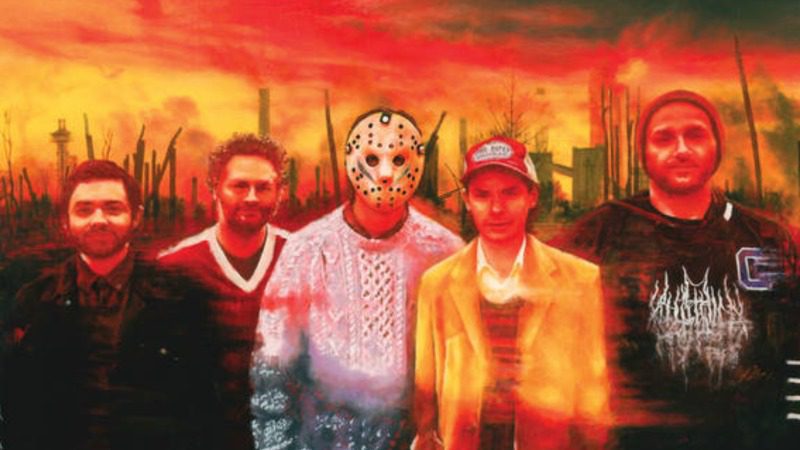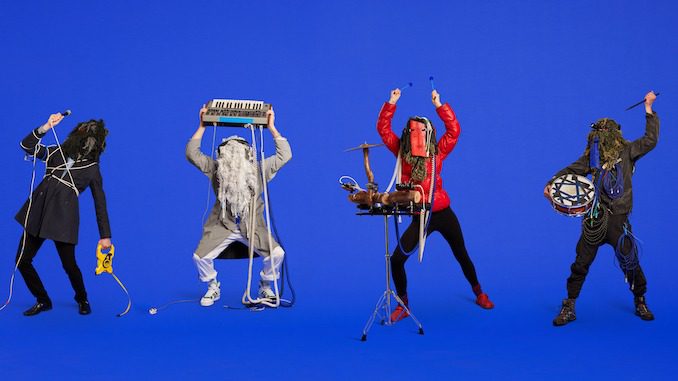Fans of both Hayden Pedigo and Chat Pile might observe an obvious tension between the sonic qualities of their music. The artists did too, but instead of watering down their differences, they aimed to create an album that could hold the extremes of their musical sensibilities simultaneously. Opener “Outside” functions like a prologue written by Pedigo, shuffling in the calm, reverberating electric guitar sound that’s characteristic of his catalogue, on I’ll Be Waving As You Drive Away especially. The noisiness of Chat Pile creeps in as this song cedes into the next: a gloomy ballad called “Demon Time” that begins at a simmer, letting guitar strings ring out and linger under the sleepy voice of Raygun Busch, who addresses the subject with, “Hey, stupid eyes.” A clammy bass fades into the mix, embellishing the song with a thick smog that creates a sound distinct from both Pedigo and Chat Pile’s styles.
A song like “The Matador” scales the peaks and valleys of what a guitar can do on just one track, flipping between sections of wild distortion, flash metal, and an eerie, droning calm. The contradicting elements of a song like this shouldn’t work, but the track’s near-8-minute duration allows for each style to serve its time completely before dissolving. But the genre difference of Pedigo and Chat Pile does sound especially vast, especially when their collaboration feels less like a distinct sound and more like a collage of influences pasted together. You can hear that on a song like “Never Say Die!”: Chat Pile’s sound dominates in a cacophony of rousing percussion and shouted lyrics. It stands on its own as a strong screamo track but can be difficult to contextualize within an album featuring Pedigo so prominently. He and Chat Pile work best together when they’re both attempting to create something entirely new, like on the track “The Magic of the World,” which unleashes the mire of Busch’s voice and cuts through Pedigo’s dreamy accompaniment. What starts with a wash of finger-picked melodies evolves into a deeper sound, increasing the dimension with stems of vocals and errant guitar strumming that produces a rippled, textured effect until it fades into “Fission_Fusion,” which completely transforms genres at its impetus, putting up an impenetrable wall of noise that’s as abrasive as it is cathartic. This is where the album reaches a state of equilibrium, slowly dialing back the distortion while the bass drum pounds steadily.
By the end of “Fission_Fusion,” In the Earth Again fades like a nuclear fallout. The music is steeped in apocalyptic subtext, zeroing in on the darkened corners of modern living and holding a mirror up to them. “Radioactive Dreams” imagines life on the other side of the world’s end, as Busch imagines himself “sitting now half in the earth with the ghosts of my friends.” In this void “the echo is endless,” he reckons, and the instrumentation around him aids in painting this liminal space, with guitars echoing endlessly. “Radioactive Dreams” utilizes the distinct heaviness of Chat Pile as a disaster warning, and the comedown from that disorder is hauntingly vacant like the Southwestern pastorals that grow from Pedigo’s phrasings.
After the album’s lapse in optimism, “A Tear For Lucas” highlights the complexities of believing in a brighter future. “I wish I could hold the planet up with my two hands and make it right,” sings Busch, his candor a standout packed with Pedigo’s simply strummed guitar. The song comes around to a place of precarious hopefulness, ending the record with a tease of optimism: “All there is is forward and our memory, so I’ll toast to my friend while time allows.” “A Tear For Lucas” bookends the album’s narrative, slotting into place as the epilogue of the project. It’s one of several songs on the album that would have been impossible without Pedigo and Chat Pile’s chemistry with each other, joining the ranks of “Demon Time” and “Behold a Pale Horse” as songs full of fascinating ideas uncommon in the solo work of either artist. With other songs, it’s difficult to detect the collaborative aspects at all. The instrumentals for “I Got My Own Blunt to Smoke” and “Inside” would sound like runoff from Pedigo’s The Happiest Times I Ever Ignored if it weren’t for splashes of Chat Pile’s strangeness; I question their inclusion over, say, material that would have better merged the qualities of both artists. But, when a broader framework gets introduced and filled with epics like “Fission_Fusion” and “The Matador,” the genre of In the Earth Again is unquantifiable. Even in discordance and confusion, Pedigo and Chat Pile have nothing but potential to offer.




